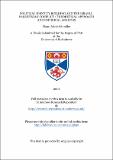Files in this item
Political identity building and the Israeli-Palestinian conflict : theoretical approach and empirical analysis
Item metadata
| dc.contributor.advisor | Hinnebusch, Raymond A. | |
| dc.contributor.author | Schindler, Hans-Jakob | |
| dc.coverage.spatial | 384 p. | en_US |
| dc.date.accessioned | 2018-06-08T12:36:36Z | |
| dc.date.available | 2018-06-08T12:36:36Z | |
| dc.date.issued | 2001 | |
| dc.identifier.uri | https://hdl.handle.net/10023/13848 | |
| dc.description.abstract | This thesis develops a general theoretical approach to political identity building under emerging conditions of globalisation. This theoretical approach is used to analyse political developments in Israeli and Palestinian societies since the start of the Oslo process in 1993. Combining Rosenau's concepts of 'frontiers' and 'fragmegration' with Wendt's analysis of identity in international relations, a three level model for political identity building is developed. It argues that political identity is formed on the substate, state and the supra-state level. Although the state level is maintained as an important location for political identity, it is argued that the concept of 'national identity' is too limited a variable under emerging conditions of globalisation. Six main significators of political identity are analysed: territory, ethnicity, history, language, religion and gender. These cut across all three levels. The case studies use a series of in-depth interviews with political actors on all three levels. It is shown that both societies are currently experiencing a deep identity crisis. Different political identity groups have developed which lack common ground in their conceptions of what kind of states Israel or Palestine should be. Israeli society is increasingly fragmenting on all three levels of political interaction. In consequence, the state level is turning into a battleground for particular political identities and is increasingly unable to establish societal cohesion. Palestinian society experiences an increasing isolation of the state level. This is due to the autocratic and neo- patrimonial structure of the Palestinian Authority which marginalised the substate and the supra-state level from political decision making. Therefore, here too, societal cohesion cannot be generated on the state level. In consequence, opposition to the Palestinian Authority and the peace process in general is strengthened. | en_US |
| dc.language.iso | en | en_US |
| dc.publisher | University of St Andrews | |
| dc.subject.lcc | DS119.7S5 | |
| dc.title | Political identity building and the Israeli-Palestinian conflict : theoretical approach and empirical analysis | en_US |
| dc.type | Thesis | en_US |
| dc.type.qualificationlevel | Doctoral | en_US |
| dc.type.qualificationname | PhD Doctor of Philosophy | en_US |
| dc.publisher.institution | The University of St Andrews | en_US |
This item appears in the following Collection(s)
Items in the St Andrews Research Repository are protected by copyright, with all rights reserved, unless otherwise indicated.

